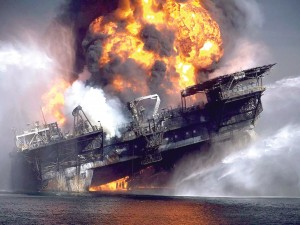BP spill victims still demand justice
4th September 2018 · 0 Comments
By Christopher Tidmore
Contributing Writer
At a press conference on Friday, August 31, 10:30 a.m., just before the dawn of the Labor Day weekend, Lt. General Russel Honore (Ret.), Lafitte Mayor Timothy Kerner and a group of health victims from those who cleaned up or fought the BP Oil Disaster delivered over 70,000 petition signatures to the steps of the Law Offices of Herman, Herman and Katz in Downtown New Orleans demanding restitution.
As their petition noted, in the eight years since the largest oil spill in America’s history was caused by the explosion of the Deepwater Horizon in the Gulf of Mexico— of the more than 37,000 qualified medical benefit claims submitted by cleanup workers, first responders, and coastal residents—only approximately 40 have been paid.
As Jonathan Henderson, Organizer for BPhealthjustice.com, noted to The Louisiana Weekly, “Many people who are sick with chronic conditions are being forced to file an individual lawsuit against BP and pay a $400 filing fee to do so. Eight years after the spill, none of these claimants have been able to present their evidence to a jury. Those who opted out of the settlement have fared no better, because Judge Carl Barbier has allowed these cases to be stayed indefinitely.”

April 21, 2010 file photo shows the Deepwater Horizon oil rig buringing after an explosion in the Gulf of Mexico, off the southeast tip of Louisiana.
“Worse,” Henderson continued, “The attorneys on the Plaintiffs Steering Committee walked away with more than $700 million and the politically-appointed Claims Administrator walked away with $155 million. However, of the tens of thousands of clean-up workers and others suffering with health-related problems who submitted a claim in the outlined process, only 20 percent were given even the minimum compensation – $1,300.”
Russel Honore specifically targeted for responsibility the Partners of the Law Firm before which the press conference occurred. As the retired Lt. General emphasized, “BP bombed our clean-up workers with chemicals while failing to provide the necessary protective gear. A handful of lawyers including Mr. Herman made off with hundreds of millions of dollars. I speak up this Labor Day weekend for those clean up workers and coastal residents that continue to suffer this great injustice.”
Henderson and the General contended that cleanup workers were injured and made sick with a variety of chronic conditions because neither BP or the federal government, despite objections by Occupation Safety Health Administration (OSHA) required cleanup workers to be provided with safety equipment, such as respirators, gloves, boots, Tyvek suits and similar protective gear. Moreover, many cleanup workers and zone residents have developed cancer, blood diseases, and neurologic problems related to the toxic oil/correxit mixture and other toxic exposures from the BP spill and cleanup, but compensation for the aforementioned chronic conditions has been effectively eliminated.
Under the Medical Benefits settlement process, to help those now suffering with, or having died from chronic conditions like leukemia, cancers or respiratory issues, only 40 claims—out of more than 37,000 which qualified for compensation—were paid for their serious chronic condition cases.
Therefore, they concluded, the Claims Administrator, in charge of processing and paying up to $60,000 to qualified victims in the first round of claims to injured people who helped in the cleanup or lived in the designated disaster zones, suddenly changed the rules and saved BP over a billion dollars in pay-outs since 2010.
Mayor Timothy Kerner of Lafitte, Louisiana warned, “The shrimpers and fishermen in our community need to take the BP health risk very seriously even eight years after the spill. I urge them to come together because we are still getting sick and dying. You need to know what you can do to be proactive about your health.”
Former clean-up worker Luke Boudreaux recollected, “I stepped up to the plate as a citizen of Louisiana to help clean up the oil spill only to become critically ill because of the toxic chemicals. I spent 3 weeks in the hospital and even fell into a coma. I lost everything, and almost lost my life. It’s disgusting to find out the lawyers, including Stephen Herman, made over $650 million while I have received zero.”
Sheree Stuart, widow of Frank Stuart, the engineer that helped manage response operations, charged, “To reduce their first round settlement, BP lawyers limited settlements for illness before diagnosed April 2012. Their argument was they would set aside settlement money for the cancers that would come years later. I call that premeditated murder. They had the opportunity to notify workers of symptoms to watch for, and setup screening, monitoring, and a medical protocol to follow so workers could avoid extensive health issues and death that hit our family like a baseball bat upside our heads. They notified no one.”
Henderson announced that a forthcoming documentary on the plight of the cleanup workers will soon make an appearance in local forums, and that more information on the fight for restitution can be found at http://www.bphealthjustice.com/.
This article originally published in the September 3, 2018 print edition of The Louisiana Weekly newspaper.



